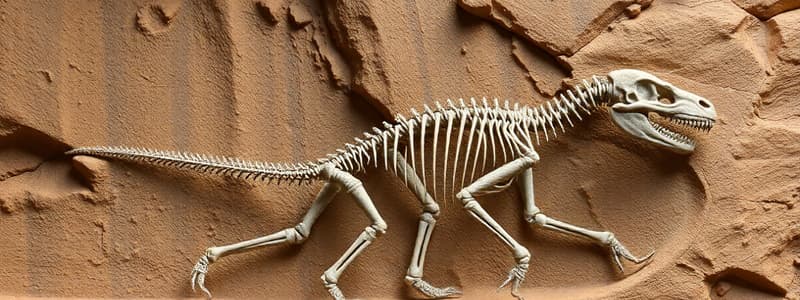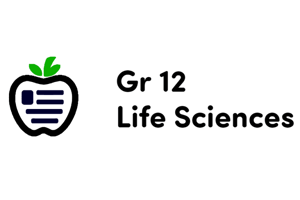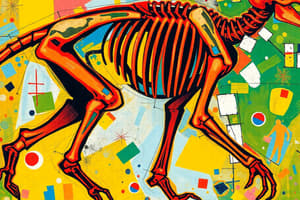Podcast
Questions and Answers
What theory did George Cuvier propose to explain the changes in fossil records?
What theory did George Cuvier propose to explain the changes in fossil records?
- Catastrophism (correct)
- Scala Naturae
- Gradualism
- Uniformitarianism
Aristotle believed that organisms evolve and change over time.
Aristotle believed that organisms evolve and change over time.
False (B)
Who is known as the first paleontologist?
Who is known as the first paleontologist?
George Cuvier
Charles Lyell's principle of __________ suggests that geological processes operate at the same rate now as they did in the past.
Charles Lyell's principle of __________ suggests that geological processes operate at the same rate now as they did in the past.
Match the following figures with their theories or contributions:
Match the following figures with their theories or contributions:
What is the primary classification system developed by Carolus Linnaeus?
What is the primary classification system developed by Carolus Linnaeus?
Georges-Louis LeClerc, Comte de Buffon believed in the immutability of species.
Georges-Louis LeClerc, Comte de Buffon believed in the immutability of species.
What concept did Jean-Baptiste de Lamarck propose regarding how organisms evolve?
What concept did Jean-Baptiste de Lamarck propose regarding how organisms evolve?
Thomas Malthus is known for his essay on ___ principles of population.
Thomas Malthus is known for his essay on ___ principles of population.
Match the following figures with their contributions to evolutionary thought:
Match the following figures with their contributions to evolutionary thought:
What hypothesis did Charles Darwin propose regarding the Galapagos Islands?
What hypothesis did Charles Darwin propose regarding the Galapagos Islands?
Erasmus Darwin believed that organisms could pass on traits to their offspring.
Erasmus Darwin believed that organisms could pass on traits to their offspring.
Who joined the Beagle as a naturalist in 1831?
Who joined the Beagle as a naturalist in 1831?
Natural Selection is the mechanism of ________.
Natural Selection is the mechanism of ________.
Match the following individuals with their contributions to the theory of evolution:
Match the following individuals with their contributions to the theory of evolution:
What phenomenon did Darwin observe regarding the species of South America?
What phenomenon did Darwin observe regarding the species of South America?
Charles Darwin received a Bachelor's degree in Medicine from Cambridge.
Charles Darwin received a Bachelor's degree in Medicine from Cambridge.
In which year did Alfred Russell Wallace come up with the concept of Natural Selection independently?
In which year did Alfred Russell Wallace come up with the concept of Natural Selection independently?
Aristotle believed that organisms are fixed and __________.
Aristotle believed that organisms are fixed and __________.
George Cuvier is known for his theory of __________, suggesting that the Earth has been shaped by sudden, violent events.
George Cuvier is known for his theory of __________, suggesting that the Earth has been shaped by sudden, violent events.
James Hutton proposed the concept of __________, emphasizing that gradual processes can lead to significant changes over time.
James Hutton proposed the concept of __________, emphasizing that gradual processes can lead to significant changes over time.
Charles Lyell's principle of __________ suggests that geological processes have remained consistent over time.
Charles Lyell's principle of __________ suggests that geological processes have remained consistent over time.
Carolus Linnaeus is known as the father of modern _____
Carolus Linnaeus is known as the father of modern _____
The Scala Naturae, or ladder of nature, was a concept associated with __________.
The Scala Naturae, or ladder of nature, was a concept associated with __________.
Georges-Louis LeClerc proposed that species could improve or _____ after dispersal from their point of creation.
Georges-Louis LeClerc proposed that species could improve or _____ after dispersal from their point of creation.
Jean-Baptiste de Lamarck suggested that organisms evolve through use and _____ characteristics.
Jean-Baptiste de Lamarck suggested that organisms evolve through use and _____ characteristics.
Thomas Malthus wrote an essay on 'the principle of _____.'
Thomas Malthus wrote an essay on 'the principle of _____.'
Buffon was responsible for the acceptance of an '_____ Earth' concept.
Buffon was responsible for the acceptance of an '_____ Earth' concept.
Charles Darwin was born on February 12, ______.
Charles Darwin was born on February 12, ______.
Darwin's grandfather, Erasmus Darwin, believed in the possibility of passing ______ to offspring.
Darwin's grandfather, Erasmus Darwin, believed in the possibility of passing ______ to offspring.
The mechanism of evolution described by Darwin is known as ______ Selection.
The mechanism of evolution described by Darwin is known as ______ Selection.
During the Voyage of the Beagle, Darwin noted adaptations to diverse ______.
During the Voyage of the Beagle, Darwin noted adaptations to diverse ______.
Alfred Russell ______ developed a theory of Natural Selection independently before presenting it alongside Darwin's work.
Alfred Russell ______ developed a theory of Natural Selection independently before presenting it alongside Darwin's work.
Darwin hypothesized that the Galapagos Islands were colonized by a South American ______.
Darwin hypothesized that the Galapagos Islands were colonized by a South American ______.
According to Natural Selection, those with favorable ______ will survive and reproduce better than others.
According to Natural Selection, those with favorable ______ will survive and reproduce better than others.
Darwin received a Bachelor's degree in ______ from Cambridge.
Darwin received a Bachelor's degree in ______ from Cambridge.
What belief was held by proponents of the Strict Biblical View regarding organisms?
What belief was held by proponents of the Strict Biblical View regarding organisms?
Which concept did George Cuvier propose to explain the fossil record?
Which concept did George Cuvier propose to explain the fossil record?
James Hutton's theory primarily focuses on which of the following?
James Hutton's theory primarily focuses on which of the following?
What was the main idea behind Charles Lyell's Uniformitarianism?
What was the main idea behind Charles Lyell's Uniformitarianism?
According to Aristotle's Scala Naturae, where are simple organisms located?
According to Aristotle's Scala Naturae, where are simple organisms located?
What classification system did Carolus Linnaeus develop?
What classification system did Carolus Linnaeus develop?
Which idea was proposed by Georges-Louis LeClerc, Comte de Buffon regarding species?
Which idea was proposed by Georges-Louis LeClerc, Comte de Buffon regarding species?
What was Jean-Baptiste de Lamarck's view on how organisms evolve?
What was Jean-Baptiste de Lamarck's view on how organisms evolve?
Thomas Malthus's major contribution to evolutionary theory centered around what concept?
Thomas Malthus's major contribution to evolutionary theory centered around what concept?
Which statement best represents the views of Carolus Linnaeus regarding species similarities?
Which statement best represents the views of Carolus Linnaeus regarding species similarities?
What idea did Erasmus Darwin propose regarding the evolution of species?
What idea did Erasmus Darwin propose regarding the evolution of species?
Which observation did Darwin make during his voyage on the Beagle regarding species?
Which observation did Darwin make during his voyage on the Beagle regarding species?
Which statement best describes Darwin's hypothesis about the Galapagos Finches?
Which statement best describes Darwin's hypothesis about the Galapagos Finches?
What principle regarding Natural Selection did Darwin propose?
What principle regarding Natural Selection did Darwin propose?
Which of the following was a significant contribution of Alfred Russell Wallace?
Which of the following was a significant contribution of Alfred Russell Wallace?
How did Darwin's theory challenge the idea of government welfare?
How did Darwin's theory challenge the idea of government welfare?
In what area did Darwin earn his bachelor's degree?
In what area did Darwin earn his bachelor's degree?
What observation did Darwin make about the adaptation of South American species during his voyage?
What observation did Darwin make about the adaptation of South American species during his voyage?
Flashcards
Linnaeus's Taxonomy
Linnaeus's Taxonomy
A hierarchical system for classifying organisms, grouping similar organisms into categories, developed by Carl Linnaeus.
Buffon's 'Old Earth'
Buffon's 'Old Earth'
Georges-Louis Leclerc, Comte de Buffon, proposed that Earth was much older than previously thought, and that species could change over time.
Lamarck's Evolution
Lamarck's Evolution
Lamarck proposed that species change over time as organisms adapt to their environments and that such adaptations could be inherited by their offspring.
Malthus's Principle of Population
Malthus's Principle of Population
Signup and view all the flashcards
Linnaeus vs. Aristotle
Linnaeus vs. Aristotle
Signup and view all the flashcards
Natural Selection
Natural Selection
Signup and view all the flashcards
Heritable Variation
Heritable Variation
Signup and view all the flashcards
Overproduction of Offspring
Overproduction of Offspring
Signup and view all the flashcards
Differential Survival and Reproduction
Differential Survival and Reproduction
Signup and view all the flashcards
Galapagos Finches
Galapagos Finches
Signup and view all the flashcards
Adaptation
Adaptation
Signup and view all the flashcards
Evolution
Evolution
Signup and view all the flashcards
Charles Darwin
Charles Darwin
Signup and view all the flashcards
Scala Naturae
Scala Naturae
Signup and view all the flashcards
Catastrophism
Catastrophism
Signup and view all the flashcards
Uniformitarianism
Uniformitarianism
Signup and view all the flashcards
Gradualism
Gradualism
Signup and view all the flashcards
Paleontology
Paleontology
Signup and view all the flashcards
Aristotle's View of Life
Aristotle's View of Life
Signup and view all the flashcards
Strict Biblical View of Life
Strict Biblical View of Life
Signup and view all the flashcards
Binomial Nomenclature
Binomial Nomenclature
Signup and view all the flashcards
Unity of Type
Unity of Type
Signup and view all the flashcards
Use and Disuse
Use and Disuse
Signup and view all the flashcards
Inheritance of Acquired Characteristics
Inheritance of Acquired Characteristics
Signup and view all the flashcards
Darwin's Grandfather's Contribution
Darwin's Grandfather's Contribution
Signup and view all the flashcards
The Beagle's Voyage
The Beagle's Voyage
Signup and view all the flashcards
Darwin's Observations
Darwin's Observations
Signup and view all the flashcards
Natural Selection: Heritable Variation
Natural Selection: Heritable Variation
Signup and view all the flashcards
Natural Selection: Overproduction
Natural Selection: Overproduction
Signup and view all the flashcards
Natural Selection: Survival and Reproduction
Natural Selection: Survival and Reproduction
Signup and view all the flashcards
Natural Selection: Accumulation of Favorable Traits
Natural Selection: Accumulation of Favorable Traits
Signup and view all the flashcards
Cuvier's Fossil Observation
Cuvier's Fossil Observation
Signup and view all the flashcards
Linnaeus's Classification
Linnaeus's Classification
Signup and view all the flashcards
Malthus's Population Principle
Malthus's Population Principle
Signup and view all the flashcards
Population Growth vs. Resources
Population Growth vs. Resources
Signup and view all the flashcards
Darwin's Grandfather's Legacy
Darwin's Grandfather's Legacy
Signup and view all the flashcards
Voyage of the Beagle: South America
Voyage of the Beagle: South America
Signup and view all the flashcards
Temperate vs. Tropical Species
Temperate vs. Tropical Species
Signup and view all the flashcards
Galapagos Finches: Adaptation
Galapagos Finches: Adaptation
Signup and view all the flashcards
Natural Selection: Survival of the Fittest
Natural Selection: Survival of the Fittest
Signup and view all the flashcards
Study Notes
Aristotle (384-322 B.C.)
- Believed organisms were fixed and unchanging
- Proposed the Scala Naturae (ladder of nature)
- Placed simple organisms at the bottom
- His views lasted for almost 2 millennia
Strict Biblical View
- Believed all life was created by God and was perfect
- Thought organisms did not change
- Adaptations from environment were seen as God's cleverness
Fossils
- Fossilization was not studied until the 1700s
George Cuvier (1762-1832)
- First paleontologist
- Noted fossils in deeper strata differed more from extant creatures than those in newer strata
- Concluded that Earth's history was shaped by sudden, short-lived, widespread events (Catastrophism)
James Hutton (1726-1797)
- Scottish Geologist
- Proposed that gradual, ongoing processes could create significant changes over time
- Stated that change was a product of slow, continuous processes (Gradualism)
Charles Lyell (1797-1875)
- Scottish Geologist
- Supported the concept of uniformitarianism
- Believed that the same natural laws and processes operating today also operated in the past at the same rate.
Carolus Linnaeus (1707-1778)
- Swedish botanist considered the "father of modern taxonomy"
- Created a hierarchical system for classifying organisms (Kingdom, phylum, class, order, family, genus, species)
- His system reflected God's pattern, not shared ancestry
Georges-Louis Leclerc, Comte de Buffon (1707-1788)
- Recognized that species could change over time and argued that species improved or degenerated
- Developed the concept of "unity of type"
- Recognized the Earth is far older than previously considered
Jean-Baptiste Lamarck (1744-1829)
- French Naturalist
- Noted adaptations to environments
- Proposed that gradual changes could explain the fossil record
Thomas Malthus (1766-1834)
- British economist and teacher
- Wrote an essay on population
- Argued that human populations grow faster than resources, leading to competition and struggle for survival
- This was later adopted into evolution theory
Erasmus Darwin (1731-1802)
- Charles Darwin's grandfather
- Believed in traits being passed down through heredity.
Charles Darwin (1809-1882)
- English naturalist
- Made observations and collected data during the voyage of the Beagle (5 years)
- Noticed adaptation to diverse environments and that species from the same continent were more closely related to each other, and there were similarities between fossils and living organisms
- Researched Galapagos finches, concluding similar species originated from a common ancestor from a different continent.
Alfred Russell Wallace
- Proposed Natural Selection independently from Darwin
- Presented a paper on his work to the Linnean Society of London in 1858.
Major Principles of On the Origin of Species
- Species originated from descendent ancestral species
- Evolution and change is mechanism of Natural Selection
Studying That Suits You
Use AI to generate personalized quizzes and flashcards to suit your learning preferences.
Related Documents
Description
Explore the foundational theories of evolution, from Aristotle's fixed organisms to the catastrophic ideas of George Cuvier. This quiz covers key figures in geology and paleontology, their beliefs about life's changes, and the significance of fossils. Test your understanding of how these concepts shaped our view of life on Earth.




